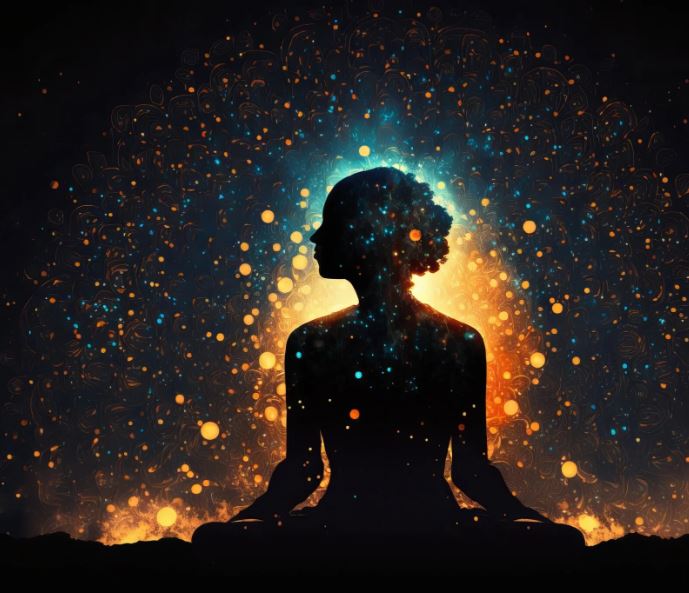
.
The simplest idea behind my vision for Radical Friendship (RF) is that a human global society should be radically about…friendship. Perhaps you imagine that IS the goal of all human endeavour already, perhaps not, but I submit that even a cursory look at the history of our species leaves a big question mark as to how committed we are to the ideal of friendship.
In our first piece on RF we said that an embrace of the profound mystery of the human condition ought to be the foundation stone for a global unity and I would like to say more about this since I think it is vital.
There is a deeply human fear about the inevitable uncertainty that surrounds the mystery of our consciousness and thus the fundamental nature of the reality we inhabit. In flight from this fear our culture raises all manner of blank cheques about the nature of fundamental reality that our collective consciousness cannot cash since we can’t validate or (thus far even plausibly theorise about) the nature of that consciousness.
While we can develop theories about the material world of consequences and measurements (what I dub consequential reality) and speculate plausibly about the human psyche in reaction to different inputs, we have no real answers to any of life’s big questions. Why am I here? Do I belong? Am I loved? Am I doing well? What is the meaning of life? What lies beyond death? Human ‘answers’ to these questions are inevitably speculative, range all over the place and do gnawingly little to address the uncertainty at the core of the human condition.
Human mental defences against uncertainty (and I think we all deploy them to varying degrees) have to be hidden from us to do their work, different people use different defences and to see ours we need someone else to point them out.
To defend ourselves against the crisis of meaning and truth at the core of a human life, we can (and do) invent non-human frameworks of meaning, attainment and (ironically) belonging. In this way, human subjectivity and uncertainty can be at least diminished. I would argue that a mental defence that allows humans to completely banish from their minds the uncertainty of life is a working definition of insanity.
So for example, we can believe that there is nothing more to this life than materialism and helpfully there is no empirical experiment that can prove otherwise! Conversely we can believe that nous and consciousness itself are fundamental and we can weave very plausible constructions of pure logic to support this.
Radical materialism and empiricism are arguably the all dominant defences of modern life against uncertainty. Many (most?) these days measure their success in terms of money, possessions, holidays, celebrity and careers.
These are non-human measurements of flourishing, they aren’t about the warmth of human love, connection, friendship, compassion or shared understanding of our lot, they are just piles of stuff, numbers in a computer system, job titles on a door and numbers of views on YouTube.
We can choose these things as measures of our human worth (and it is a very human thing to do) but their primary function is to create a series of definitions with which to banish uncertainty, measures of worth and success that we can control. Whether one puts cash or God in their pocket, the root of the impulse to do so and the underlying desired outcomes are the same.
The trouble is, our reliance on these definitions can (and often does) bring us into sharp conflict with consequential reality and with each other. Despite the relative dominance of radical materialism / empiricism, we humans still cannot agree upon a single framework for answering life’s questions and thus we restlessly fight over them.
By definition competing claims for transcendent knowledge cannot peacefully co-exist without at least a dab of Socratic scepticism.
Religious fundamentalism might seem like a coherent ally or a definite enemy but is itself split up into 10,000+ distinctly different takes on the divine. Atheists have their own prophets and as Richard Dawkins said:
“We are all atheists about most of the gods that humanity has ever believed in. Some of us just go one god further.”
Agnostics maybe believe in God but tie their camel first, potentially enraging both camps… and so it goes on.
A radical commitment to Friendship both between ourselves and in our relationship with the rest of nature, is extraordinarily difficult while competing non-human definitions of fundamental reality allow us to deny that which ought to bring us together (our lack of fundamental knowledge), while invoking conflict in defence of that which we can never prove.
To crave certainty is human and to create non-human measurements of certainty like material wealth and divine approval is also human. A radical commitment to friendship though will require not only that we collectively accept the fundamental uncertainty at the heart of the human condition, but also that we find compassionate and gentle ways to wean humanity off non-human definitions of belonging and success.
We must attend to this work before our increasingly fevered pursuit and defence of these (oft competing) definitions destroys all life on this planet.
Non-human definitions of success and flourishing are incompatible with long term human survival as climate vandalism, biodiversity destruction and the threat of nuclear war show all too clearly.
Nobody wants mysteries, everybody wants answers as to why humans seem so self-destructive and radically UN-friendly towards each other, well perhaps a fundamental embrace of mystery is the only answer we need to and indeed the only one that can lead a new and global radical friendship.
More Stories
Ukraine pays the price for the West’s addiction to propaganda over reality
Nobody should be surprised that Fascism is on the march across Europe.
Carrying water for Israel. The Guardian’s racist framing of Palestinians.